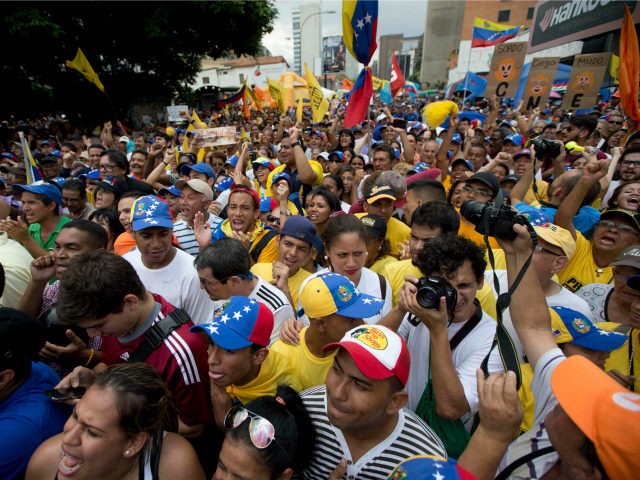Venezuelans seeking a visa to leave to the United States for the first time will no longer be able to apply for one, the U.S. embassy in Caracas announced, due to the socialist government’s forced reduction of the number of American staff working there.
The announcement comes at a time of extreme shortages in Venezuela, leading thousands to seek a better life in a capitalist country.
In March, the government of socialist president Nicolás Maduro demanded that the U.S. government reduce the number of staffers operating in the Caracas embassy from about 100 people to just 17, the number of Venezuelan nationals operating their embassy in Washington D.C. In addition to its forceful demand for the reduction, the Venezuelan government has refused to grant visas for entry to other Americans the U.S. government has attempted to install at the embassy for the purposes of keeping its services running smoothly.
With fewer staff to process applications, the embassy announced that it can no longer try to process as many applications as it receives, about 1,800 a day. “We had to make this decision because in the last eight months [Venezuela’s] Foreign Ministry hasn’t responded to various requests to increase personnel… The ministry hasn’t given us any explanation for the delay. They are not letting us operate in a normal way,” Lola Petrova, embassy spokeswoman, told Fox News Latino.
The diplomatic situation between the United States and Venezuela appears to be deteriorating, likely making it more difficult for Venezuelans to legally find their way to America. In March — when Venezuela announced it would push for a reduction in staff numbers at the U.S. embassy — CNN noted that Maduro’s government had framed the call as a response to American sanctions on law enforcement leaders responsible for a number of human rights violations against anti-socialist protesters. Maduro also enacted a law prohibiting Americans from entering the country without a visa and banned prominent Americans like George W. Bush, Dick Cheney, and Cuban-American politicians like Senator Robert Menéndez from entering the country at all.
The move comes as the American government struggles to process a growing number of visa applications from Venezuelans desperate to escape the growing poverty in the country. Years of socialist mismanagement of the OPEC member nation have left its economy in shambles, with major shortages of basic goods forcing Venezuelans to spend six to eight hours waiting on supermarket lines for rations of food. The Venezuelan legislature, the National Assembly, passed a law declaring a “nutritional emergency” in February, declaring the nation did not have enough food to feed its population. The nation’s pharmaceutical organizations have also declared an emergency, reporting that most pharmacies have run out of most known medications, from common painkillers to cancer drugs.
The ongoing shortages have triggered bouts of violence throughout the nation, from the hardest-stricken areas in western Táchira province to the capital, Caracas. Riots over bags of onions, shoes, or laundry detergent are common. An estimated 75 percent of Venezuelans live in poverty.
A drought has also limited the nation’s electrical supply. President Nicolás Maduro responded to this shortage by decreeing a three-day work week, leaving children with no schooling for most of the week and most government operations closed.
The economic situation has made it difficult for those looking to leave to do so with most of their belongings. An estimate in Miami’s Nuevo Herald suggested that up to 1.5 million Venezuelans left the country in 2015, most for America or Spain, with the government forcing them to leave most of their savings behind. While most leaving to the United States are professionals — and 70 percent of Venezuelans in the U.S. speak English proficiently, according to the Pew Research Center — upon arrival, many are living in poverty, sleeping in warehouses and struggling to find jobs.
President Maduro’s latest measure to help curb the economic crisis in the country is a recently-enacted executive order that allows him to override the National Assembly, now controlled by an anti-socialist majority. Maduro announced the move as a way to “protect the people from the constant attacks from the national right wing allied with imperialist forces and face the economic war.” His government has repeatedly accused the United States of causing Venezuela’s economic collapse by calling for Maduro to curb his police and military’s human rights abuses against protesters.
The National Assembly’s leaders have decried the executive order as yet another attempt by Maduro’s regime to stifle opposition, calling it an unconstitutional “desperation measure” to maintain control of the government.

COMMENTS
Please let us know if you're having issues with commenting.